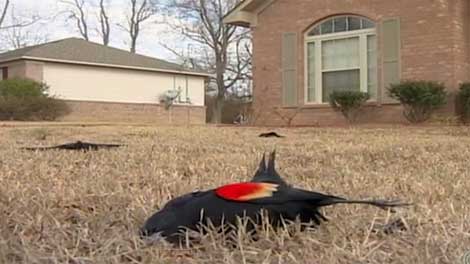LITTLE ROCK, Ark. - Wildlife experts are trying to solve a mystery that evoked images of the apocalypse: Why did more than 3,000 red-winged blackbirds tumble from the Arkansas sky shortly before midnight on New Year's Eve?
Scientists are investigating whether fireworks, poison or bad weather might have forced the birds out of the sky, or if a disoriented bird simply led the flock into the ground.
We have a lot more questions, said Karen Rowe, an ornithologist with the Arkansas Game and Fish Commission. She said there are documented cases of birds becoming confused and plunging to earth.
Residents of the small town of Beebe, northeast of Little Rock, awoke Saturday to find thousands of dead blackbirds littering a 1.5-square-mile area. The birds inexplicably dropped dead, landing on homes, cars and lawns.
Cleanup crews wore white suits, gas masks and rubber gloves as they spent the holiday weekend gathering the carcasses.
The birds will not be missed. Large blackbird roosts like one at Beebe can have thousands of birds that leave ankle- to knee-deep piles of droppings in places.
Nearly a decade ago, state wildlife officials fired blanks from shotguns and cannons to move a roost of thousands of blackbirds from Beebe, but in recent years many of the migratory birds returned.
Bird carcasses were shipped to the Arkansas Livestock and Poultry Commission and the National Wildlife Health Center in Madison, Wis. Researchers in Georgia also asked for a set of the dead birds. Test results could be back in a week.
Rowe said many of the birds suffered injuries from striking the ground, but it was not clear whether they were alive when they hit.
Blackbirds have notoriously bad eyesight. If startled at night, they could easily fly into the ground, Rowe said. A few grackles and a couple of starlings were also among the dead. Those species roost with blackbirds, particularly in winter.
Violent weather rumbled over much of the state Friday, including a tornado that killed three people in Cincinnati, Ark. Lightning could have killed the birds directly or startled them to the point that they became confused. Hail also has been known to knock birds from the sky.
In 2001, lightning killed about 20 mallards at Hot Springs, and a flock of dead pelicans was found in the woods about 10 years ago, Rowe said. Lab tests showed that they, too, had been hit by lighting.
Back in 1973, hail knocked birds from the sky at Stuttgart, Ark., on the day before hunting season. Some of the birds were caught in a violent storm's updrafts and became encased in ice before falling from the sky.
Rowe said poisoning was possible but unlikely. She said birds of prey and other animals, including dogs and cats, ate several of the dead birds and suffered no ill effects.
Every dog and cat in the neighborhood that night was able to get a fresh snack that night, Rowe said.


